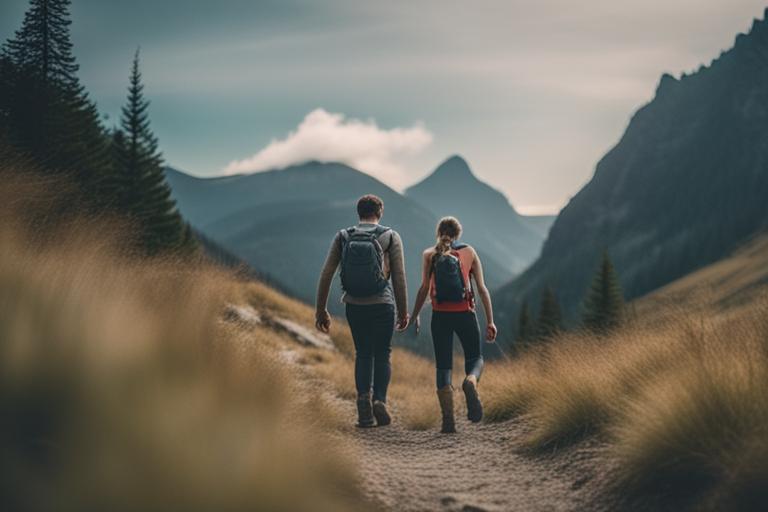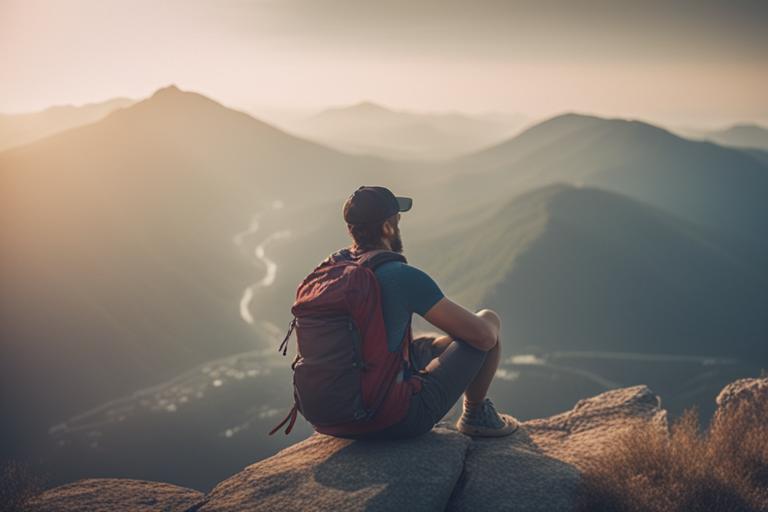What you will learn:
- The reasons why backpackers travel
- The benefits of backpacking
- How to overcome challenges and start backpacking
- Backpackers travel for a sense of adventure, to explore unfamiliar places, meet new people, and experience different cultures.
- Backpacking is budget-friendly, with accommodations, meals, and transportation being cost-effective.
- Backpacking offers freedom and flexibility to make spontaneous decisions, change itineraries, and explore off-the-beaten-path destinations.
Backpacking, a popular form of travel among young adventurers, is a unique way of exploring the world. It involves traveling with a backpack and immersing oneself in different cultures, new experiences, and unfamiliar territories. Backpacking is not just about visiting tourist attractions; it’s about embracing the unknown, seeking personal growth, and connecting with like-minded individuals. In this article, we will delve into the reasons why backpackers choose this unconventional mode of travel and explore the various benefits it offers.

Reasons for Backpacking

Sense of Adventure
One of the primary reasons why backpackers embark on their journeys is the insatiable thirst for adventure. They crave the excitement and thrill of exploring unfamiliar places, venturing into uncharted territories, and discovering hidden gems that are off the beaten path. Backpacking allows travelers to step out of their comfort zones and immerse themselves in the unknown, creating unforgettable memories along the way.
Meeting new people and making connections is another aspect of backpacking that adds to its allure. Backpackers have the opportunity to interact with individuals from diverse backgrounds and cultures, fostering meaningful connections that transcend geographical boundaries. These connections often lead to lifelong friendships and a global network of travel companions, making the world feel like a smaller and more interconnected place.
Experiencing different cultures is also a significant draw for backpackers. By immersing themselves in local customs, traditions, and ways of life, backpackers gain a deeper understanding and appreciation for the world’s cultural diversity. They have the chance to participate in community activities and events, taste authentic local cuisines, and witness firsthand the rich tapestry of human experiences.
Budget-Friendly Travel
One of the practical reasons why backpacking appeals to many travelers, especially young ones, is its budget-friendly nature. Backpackers often choose to stay in hostels or budget accommodations, which offer affordable options for overnight stays. These accommodations foster a sense of community among travelers, providing an opportunity to meet like-minded individuals and share travel stories.
Cooking meals instead of dining out is another way backpackers save on expenses. Many backpackers opt for accommodations with communal kitchens, allowing them to prepare their own meals using local ingredients. This not only helps reduce food costs but also provides a chance to experiment with different cuisines and flavors.
Utilizing public transportation is a common practice among backpackers, enabling them to navigate through cities and countries without breaking the bank. Public transportation systems, such as buses, trains, and trams, offer a cost-effective way to get around, allowing backpackers to explore multiple destinations within their budget.
Freedom and Flexibility
One of the key advantages of backpacking is the freedom and flexibility it provides. Unlike traditional travel itineraries, backpackers have the liberty to make spontaneous decisions and change their plans on the go. They are not bound by rigid schedules or pre-booked accommodations, allowing them to adapt their journeys based on their interests, recommendations, and unforeseen opportunities.
Backpackers often find joy in exploring off-the-beaten-path destinations, away from the crowded tourist hotspots. These hidden gems offer a more authentic and unique travel experience, allowing backpackers to connect with the local culture and environment on a deeper level. The freedom to deviate from the well-trodden path is what sets backpacking apart from conventional travel.

Cultural Immersion
Cultural immersion is a significant aspect of backpacking that enhances the overall travel experience. Backpackers have the opportunity to learn new languages, engage with locals, and gain insights into different ways of life. By interacting with people from diverse backgrounds, backpackers broaden their horizons and develop a greater understanding and appreciation for cultural differences.
Trying local cuisines is an integral part of cultural immersion for backpackers. They savor the flavors of a destination through street food, traditional dishes, and local delicacies. Food acts as a gateway to understanding a culture’s history, traditions, and social dynamics, allowing backpackers to connect with the local community on a deeper level.
Participating in community activities and events is another way backpackers immerse themselves in the local culture. Whether it’s joining a traditional dance class, attending a religious ceremony, or volunteering for a community project, backpackers actively engage with the local community, fostering a sense of connection and understanding.

Personal Growth and Self-Discovery
Backpacking offers a transformative journey of personal growth and self-discovery. It pushes individuals out of their comfort zones, presenting them with challenges and opportunities for growth. Overcoming these challenges builds resilience and confidence, empowering backpackers to face obstacles head-on and develop a strong sense of self.
Adapting to new environments is a crucial skill that backpackers acquire during their journeys. They learn to navigate through unfamiliar territories, communicate in foreign languages, and adjust to different cultural norms. This adaptability fosters a sense of resourcefulness and open-mindedness, which can be applied to various aspects of life.
Backpacking provides a platform for individuals to gain a deeper understanding of themselves and their place in the world. The solitude and introspection that come with solo travel allow backpackers to reflect on their values, goals, and aspirations. It is a transformative experience that often leads to increased self-awareness and a broader perspective on life.
Connection with Like-Minded Travelers
One of the most rewarding aspects of backpacking is the opportunity to connect with like-minded travelers from all around the world. Backpackers often form deep and meaningful friendships with fellow adventurers, bonding over shared experiences, and a common love for exploration. These connections go beyond the boundaries of nationality, language, and culture, creating a global network of travel companions.
Sharing experiences and stories with other backpackers is an integral part of the backpacking culture. Travelers gather in hostels, cafes, and communal spaces, exchanging tales of adventure, offering recommendations, and inspiring each other to explore new horizons. These interactions create an environment of camaraderie and support, making the backpacking community a tight-knit and welcoming one.
Environmental Awareness and Sustainability
Backpackers often have a heightened awareness of their environmental impact and strive to minimize it. They understand the importance of preserving natural resources and respecting the ecosystems they encounter during their travels. Backpacking promotes sustainable practices such as minimizing waste, conserving energy, and supporting local businesses that prioritize environmental stewardship.
By staying in eco-friendly accommodations, backpackers contribute to sustainable tourism. These accommodations prioritize practices such as waste reduction, water conservation, and the use of renewable energy sources. Backpackers also support local businesses and communities, contributing to the economic growth and preservation of cultural heritage in the places they visit.
Respecting cultural norms and practices is another aspect of environmental awareness for backpackers. They recognize the importance of cultural sensitivity and strive to engage with local communities in a respectful manner. By doing so, backpackers contribute to the preservation and celebration of diverse cultural traditions.
Challenges and Solutions
Overcoming Challenges
While backpacking offers numerous rewards, it is not without its challenges. Language barriers and communication issues can pose a hurdle for backpackers, especially in countries with different linguistic backgrounds. Navigating daily interactions, reading signs, and asking for directions can become daunting tasks. However, with perseverance and a willingness to learn, backpackers can overcome these challenges by utilizing language learning resources and tools.
Homesickness and loneliness can also be common challenges for backpackers, particularly during long journeys. Being away from familiar surroundings and loved ones can evoke feelings of longing and isolation. However, adopting coping strategies such as staying connected through technology, engaging in social activities, and seeking support from fellow travelers can help alleviate these feelings.
Navigating unfamiliar transportation systems can be overwhelming for backpackers, especially in cities with complex networks. Understanding the local transportation options, researching routes, and seeking advice from locals or fellow travelers can provide the necessary guidance to navigate through these challenges.
Solutions and Tips
Language learning resources and tools can assist backpackers in overcoming language barriers. Online language courses, language learning apps, and phrasebooks can be valuable resources for learning basic phrases and building confidence in communicating with locals. Additionally, engaging in language exchange programs or hiring local guides can enhance the language learning experience.
Coping strategies for homesickness and loneliness include staying connected with loved ones through video calls or social media, joining local events or meetups, and participating in group activities organized by hostels or travel communities. Embracing solo travel as an opportunity for self-reflection and personal growth can also help shift the focus from feelings of homesickness to the excitement of the journey.
Researching and understanding local transportation systems is essential for navigating unfamiliar territories. Online resources, travel forums, and apps dedicated to public transportation can provide valuable information on routes, schedules, and fares. Seeking advice from locals or fellow travelers who have previously visited the destination can also offer valuable insights and tips.
How to Start Backpacking
Planning an itinerary and choosing destinations
Before embarking on a backpacking journey, it is crucial to plan an itinerary and choose destinations that align with personal interests and preferences. Researching the destinations, understanding their cultural nuances, and considering factors such as weather, safety, and visa requirements are essential steps in the planning process. It is also important to strike a balance between well-known tourist destinations and off-the-beaten-path gems to create a diverse and enriching travel experience.
Packing essentials for a backpacking trip
Packing efficiently is key to a successful backpacking trip. Essential items such as a sturdy backpack, comfortable clothing, appropriate footwear, a travel first aid kit, and essential toiletries should be prioritized. It is important to pack light and consider the climate and activities planned during the trip. Additionally, including important documents such as passports, travel insurance details, and emergency contact information is crucial for a smooth and stress-free journey.
Budgeting tips and resources
Budgeting plays a significant role in backpacking. Creating a realistic budget that includes accommodation, transportation, meals, activities, and emergency funds is essential. Researching budget travel tips and utilizing online resources and apps dedicated to finding affordable accommodations, cheap flights, and local deals can help stretch the budget further. Being mindful of expenses, tracking spending, and making conscious choices can ensure a sustainable and enjoyable backpacking experience.

Inspirational Stories
Real-life experiences of backpackers
The world of backpacking is filled with inspiring stories of personal growth, resilience, and transformation. Backpackers often recount tales of conquering their fears, overcoming challenges, and discovering their true passions. These stories highlight the transformative power of travel and serve as a reminder of the endless possibilities that await those who embark on a backpacking journey.
Impact of backpacking on their lives
Backpacking has a profound impact on the lives of those who undertake the journey. It broadens horizons, challenges preconceived notions, and instills a sense of curiosity and wonder. Backpackers return from their journeys with a renewed perspective, a deeper appreciation for cultural diversity, and a greater understanding of their place in the world. The experiences gained while backpacking often shape their values, goals, and aspirations, leading to personal and professional growth.
Lessons learned and personal transformations
Through backpacking, individuals learn valuable life lessons that shape their character and outlook on life. They learn the importance of resilience, adaptability, and embracing uncertainty. Backpackers grow in confidence, become more self-reliant, and develop a strong sense of resourcefulness. These personal transformations extend beyond their travel experiences, empowering them to face challenges and embrace opportunities in all aspects of life.
Personal Transformation Through Backpacking: A Case Study
One inspiring story that illustrates the transformative power of backpacking is the journey of Sarah Johnson. Sarah, a 25-year-old recent college graduate, decided to embark on a solo backpacking trip through Southeast Asia after feeling lost and unsure about her future.
During her travels, Sarah found herself in unfamiliar places, surrounded by people from different cultures and backgrounds. She pushed herself out of her comfort zone, engaging in conversations with locals and fellow travelers, and learning about their way of life. Through these interactions, Sarah gained a newfound appreciation for diversity and developed a deeper understanding of global issues.
Facing challenges such as language barriers and navigating unfamiliar transportation systems, Sarah learned to become more resourceful and adaptable. She discovered her own resilience and problem-solving skills, which gave her a boost of confidence and self-assurance.
One of the most significant aspects of Sarah’s backpacking experience was the opportunity for personal growth and self-discovery. Being away from her familiar surroundings and the expectations of others allowed her to reflect on her own values, goals, and aspirations. Sarah realized that she wanted to pursue a career that aligned with her passion for sustainable tourism and environmental conservation.
Upon returning from her backpacking trip, Sarah enrolled in a graduate program focused on sustainable tourism development. She became an advocate for responsible travel practices and started a blog to share her experiences and insights with others. Sarah’s backpacking journey not only transformed her own life but also inspired others to explore the world with a mindful and sustainable approach.
Sarah’s story exemplifies the life-changing potential of backpacking. It shows how immersing oneself in different cultures, overcoming challenges, and embracing new experiences can lead to personal growth, self-discovery, and a sense of purpose. By stepping outside of their comfort zones and embarking on a backpacking adventure, individuals like Sarah can find direction, meaning, and a renewed sense of purpose in their lives.
Conclusion
Backpacking is a journey of self-discovery, cultural immersion, and personal growth. The reasons why backpackers choose this unconventional mode of travel are as diverse as the travelers themselves. From the sense of adventure and the freedom to explore to the budget-friendly nature and the opportunity for cultural immersion, backpacking offers a unique and enriching travel experience. It challenges individuals to step out of their comfort zones, embrace the unknown, and connect with like-minded individuals from all around the world. So, if you’re contemplating embarking on a backpacking journey, don’t hesitate. The world is waiting to be explored, and within it, you’ll find a path to self-discovery and a lifetime of memories.
FAQs
Why do backpackers travel?
Backpackers travel to explore new cultures and gain unique experiences.
What motivates backpackers to travel?
Backpackers are motivated by a sense of adventure and wanderlust.
How do backpackers afford to travel?
Backpackers save money, work abroad, or find budget-friendly accommodations.
Who can become a backpacker?
Anyone with a passion for travel and a desire to embrace a nomadic lifestyle.
What if I don’t have much travel experience?
Backpacking is a great way to start traveling and learn along the way.
How can backpacking benefit me?
Backpacking allows you to develop independence, resilience, and global perspective.
[Author’s Name], a seasoned traveler and backpacking enthusiast, brings a wealth of experience and expertise to the topic of backpacking. With over a decade of globetrotting under their belt, [Author’s Name] has explored various corners of the world, immersing themselves in different cultures and gaining a deep understanding of the motivations behind backpacking.Having personally experienced the sense of adventure, freedom, and personal growth that backpacking offers, [Author’s Name] is well-versed in the reasons why travelers choose to hit the road with just a backpack on their shoulders. They have encountered and overcome numerous challenges along the way, developing practical solutions and valuable tips that they are eager to share with readers.
In addition to their own experiences, [Author’s Name] has conducted extensive research on the topic, delving into studies and scholarly articles to provide readers with evidence-backed insights. Their passion for environmental awareness and sustainability has also led them to explore the impact of backpacking on the environment, offering readers a comprehensive understanding of the subject.
Through their writing, [Author’s Name] aims to inspire and educate aspiring backpackers, providing them with the tools and knowledge to embark on their own transformative journeys.




